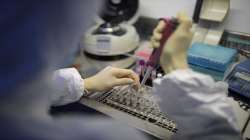COVID-19: Antibody-detection tool can reveal coronavirus infection from past
Researchers at Harvard Medical School and Brigham and Women's Hospital have developed an antibody-detection tool to study the aftermath of infections by novel coronavirus that is causing the current global pandemic.

Researchers at Harvard Medical School and Brigham and Women's Hospital have developed an antibody-detection tool to study the aftermath of infections by novel coronavirus that is causing the current global pandemic. The tool called �VirScan' detects antibodies in people's blood that indicate active and past infections by viruses and bacteria.
From a single drop of blood, VirScan tests for antibodies against more than 1,000 different strains of viruses and bacteria that may have infected a person, whether around the time of testing or decades earlier.
Developed by Stephen Elledge, the Gregor Mendel Professor of Genetics and of Medicine at Harvard Medical School and Brigham and Women's, this test differs from typical blood tests known as ELISA assays, which look for one pathogen at a time.
"The situation right now is extremely difficult, but it's great to be in a position to apply all these new methods to an important human health problem," said Elledge.
The researchers anticipate that VirScan could be deployed to analyze samples in mid-April.
It also differs from the tests currently used to diagnose COVID-19. Those tests rely on mucus swabs from the nose and throat and look for nucleic acids that signal that the SARS-CoV-2 virus is contained in the sample.
The CDC and other testing facilities are looking for the presence of the virus, which is critical.
"Our assay can detect whether someone's immune system has engaged the virus. We can tell when someone has harboured the virus but doesn't have it anymore," Elledge added.
Because it takes five to 10 days for a person to develop antibodies, Elledge said �VirScan' would not be used to provide real-time diagnoses of infection with SARS-CoV-2, the virus that causes COVID-19.
However, the results could lead to better estimates of true infection and lethality rates by capturing cases that may have gone undetected and could inform the development of vaccines.
They could also reveal new insights into the fundamentals of human immunity.
ALSO READ | COVID-19 case reported in Russia's presidential administration
ALSO READ | Afghan economy can't withstand US aid cut, COVID-19 impact